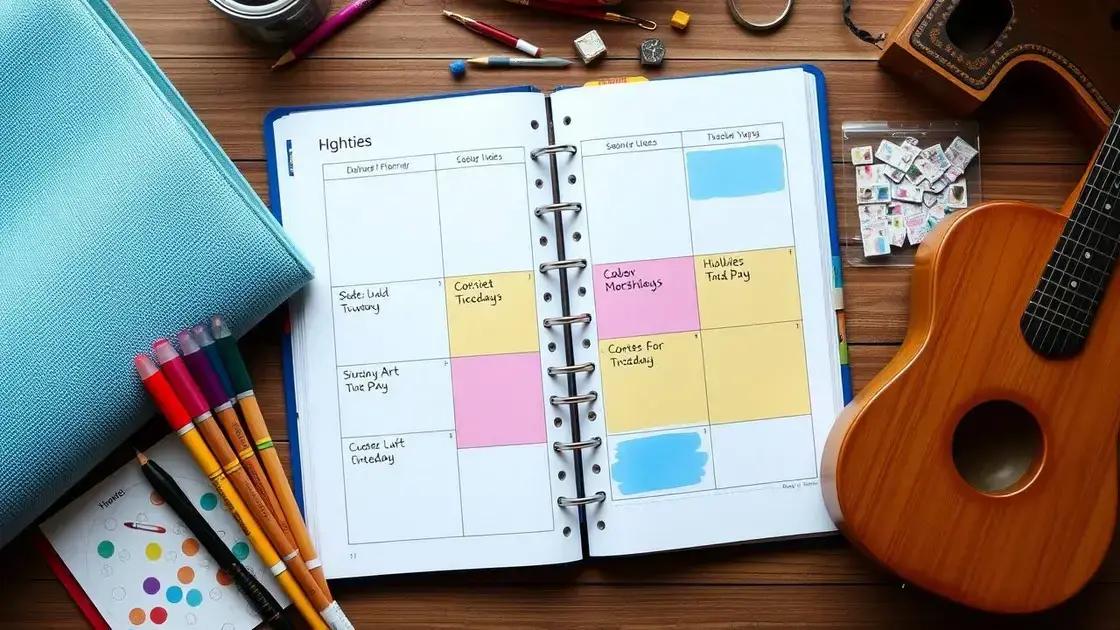The role of hobbies in maintaining mental and emotional balance is significant, as engaging in enjoyable activities promotes stress relief, enhances cognitive function, builds social connections, and boosts self-esteem, all contributing to improved mental health and overall well-being.
In today’s fast-paced world, finding ways to maintain mental and emotional balance is essential. The role of hobbies in achieving this balance cannot be overstated. By engaging in activities that spark joy and creativity, individuals can foster better emotional health and alleviate stress. In this article, we will delve into how hobbies contribute to well-being, explore some top hobbies for mental health, and guide you on creating a balanced hobby schedule.
Understanding Mental and Emotional Balance

Mental and emotional balance is crucial for overall well-being. It refers to the state where a person can effectively manage stress, adapt to change, and maintain a positive outlook. Achieving this balance is not always easy, but it can be significantly supported by engaging in various hobbies.
Understanding Mental Balance
Mental balance involves having clarity of thought, being able to make decisions easily, and managing worries efficiently. When our minds are balanced, we can think critically and respond to challenges with resilience.
Emotional Balance Explained
Emotional balance, on the other hand, involves recognizing, understanding, and managing our emotions. It means being aware of how we feel and being able to express those feelings appropriately. When we are emotionally balanced, we can communicate effectively and build strong relationships.
How Hobbies Enhance Balance
Participating in hobbies can create a sense of fulfillment that positively influences both mental and emotional balance. Hobbies offer a break from routine stressors and allow for creative expression. Activities like painting, gardening, or playing a musical instrument can help clear the mind and elevate mood.
Benefits of Achieving Balance
Striving for mental and emotional balance can lead to improved focus, better relationships, and lower levels of anxiety. By cultivating a balanced state, individuals can navigate life’s ups and downs with greater ease. This is where hobbies play a vital role, acting as both a diversion and a source of joy.
How Hobbies Contribute to Well-Being

Hobbies play a vital role in promoting overall well-being. Engaging in activities outside of daily responsibilities allows individuals to recharge and restore balance in their lives. Beyond mere enjoyment, hobbies contribute significantly to our mental and emotional health.
Stress Relief Through Hobbies
Many hobbies, such as gardening, painting, or playing sports, serve as effective stress relievers. When we immerse ourselves in activities we love, it shifts our focus away from daily challenges. This can lower stress levels and improve our mood.
Improving Cognitive Function
Participating in hobbies that require mental engagement, like puzzles, reading, or learning a musical instrument, can enhance cognitive function. These activities stimulate the brain, helping to improve memory and concentration.
Building Social Connections
Joining a hobby group or class fosters social interaction, which is crucial for emotional well-being. Making connections with others who share similar interests can lead to friendships and provide a support network. This sense of community helps combat feelings of loneliness and isolation.
Enhancing Self-Esteem
Mastering a hobby can boost self-esteem and confidence. As individuals see their skills improve, they gain a sense of accomplishment. This positive feeling can translate into other areas of life, promoting a healthier, more balanced mindset.
Top Hobbies for Mental Health

Several hobbies can significantly improve mental health. These activities are not just fun, but also beneficial for our emotional well-being.
1. Art and Craft
Engaging in art and craft activities, such as painting or knitting, allows for creative expression. This helps reduce anxiety and offers an outlet to process emotions.
2. Physical Exercise
Physical hobbies like yoga, running, or dancing are excellent for mental health. Exercise releases endorphins, known as “feel-good” hormones, which can enhance mood and reduce feelings of depression.
3. Gardening
Gardening can be therapeutic. Connecting with nature promotes relaxation and serves as a positive distraction from stressful thoughts.
4. Playing a Musical Instrument
Learning to play a musical instrument can improve focus and cognitive abilities. Making music is also a powerful way to express emotions and can be quite fulfilling.
5. Reading and Writing
Both reading and writing are great mental activities. They stimulate the brain and can serve as a form of escapism, allowing individuals to explore different worlds and ideas.
6. Cooking and Baking
Cooking and baking can be incredibly satisfying. The process of creating something delicious can boost self-esteem and also provides a chance to practice mindfulness.
7. Volunteering
Participating in volunteering activities helps create a sense of purpose. Helping others can lead to improved self-worth and happiness.
Creating a Balanced Hobby Schedule

Creating a balanced hobby schedule is essential to ensure that you devote adequate time to activities that enrich your life. Here are some tips on how to do this effectively:
1. Assess Your Current Commitments
Start by taking a look at your current schedule. Identify times when you feel overwhelmed and consider how you can allocate time for hobbies. Knowing your available time helps create a realistic plan.
2. Prioritize Your Hobbies
Make a list of hobbies that you want to include. Determine which activities bring you the most joy or relaxation. Prioritizing these hobbies ensures that you spend time on what really matters to you.
3. Set Realistic Goals
It’s important to set achievable goals for how often you can engage in each hobby. Instead of trying to fit everything in, focus on a few key activities per week. This helps prevent burnout and keeps you motivated.
4. Create a Weekly Schedule
Once you know your priorities, create a weekly schedule. Block out specific times dedicated to your hobbies, just like you would for work or school. This method makes it easier to commit.
5. Leave Room for Flexibility
While it’s essential to have a plan, it’s also important to stay flexible. Life can be unpredictable, so allow for changes in your schedule without feeling guilty.
6. Evaluate and Adjust
After a few weeks, take time to review your schedule. Check if you are feeling balanced and happy with the hobby time you allocated. Adjust as needed to find the right balance for you.
Embracing Hobbies for a Healthier Mind
The role of hobbies in maintaining mental and emotional balance is crucial for overall well-being. By understanding mental and emotional balance, we see how hobbies contribute to a healthier lifestyle.
Engaging in activities that bring joy, such as art, exercise, or gardening, can enhance our mental health. A balanced hobby schedule allows for flexibility and ensures we dedicate time to what fulfills us.
As we prioritize and incorporate hobbies into our lives, we not only improve our emotional state but also strengthen our relationships and self-esteem. Therefore, embrace the joys of hobbies and unlock their powerful benefits for a balanced and happier life.
FAQ – Frequently Asked Questions about Hobbies and Mental Health
How do hobbies improve mental health?
Hobbies provide a means of stress relief, stimulate creativity, and foster a sense of accomplishment, all of which can enhance mental well-being.
What are some good hobbies for reducing anxiety?
Activities like gardening, painting, yoga, and playing music are well-known for their ability to reduce anxiety and promote relaxation.
How can I fit hobbies into my busy schedule?
You can create a balanced hobby schedule by assessing your current commitments, prioritizing enjoyable activities, and setting specific time blocks for these hobbies.
Can social hobbies really help with loneliness?
Yes! Social hobbies, such as joining a club or class, can help you connect with others, thereby reducing feelings of loneliness and fostering friendships.
Is it necessary to have a lot of time for hobbies?
No, even short periods of engagement in hobbies can be beneficial. Quality time spent on activities you enjoy can significantly impact your emotional health.
How can I choose the right hobby for me?
Consider your interests, what you enjoy doing in your free time, and what activities make you feel fulfilled. Trying different hobbies can also help you find the right fit.













